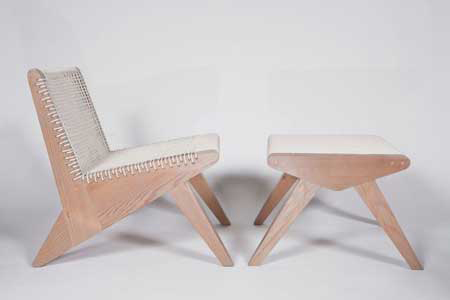
Continuing through June 16, 2012
"PLANEfurniture" is an erudite yet accessible show focusing on various porous boundaries we take for granted today: between form and function, pure design and aesthetics, science and art, standard artistic media and the digital age, the modern and the so-called post modern to name a few. Featured are contemporary functional objects — chairs, desks, tables — by noted designer Michael Boyd that will put you in mind of Schindler and all the pristine logic that name implies. In fact the rational, ordered simplicity we see here harkens further back and more directly to the formal and philosophical ethos of the Constructivist/Bauhaus schools. That underlying credo included the idea (so evident here) that rather than summarily reject the inevitably of consumer culture and capitalism, designers and artists are obliged to return to easy-assemble objects imagined from simple Platonic shapes.
The idea (perhaps even more timely today as resources dwindle and class divisions sharpen) was that crowding, urbanization and the advance of high technology are the givens of progress. As such, affordable, durable and beautifully conceived objects should not add to landfills and planned obsolescence, but support the common good. The confluence of fine art and good design was to be a win-win: satisfied makers and delighted consumers would promote an imagined populist visual utopia.
In "PLANEfurniture" Cezanne’s classic cone, rod and sphere are recombined imaginatively in objects for the home crafted by hand from low cost sustainable materials. Boyd — a skilled collector of art and respected artist – surely seems to have had some version of this modernist manifesto in mind when he conceived of these one of a kind, easily stored, space efficient, stunningly refined usable sculptures. The ‘Plane’ in the title seems to be a play on words, referring dually to seating surfaces and tables made primarily of smartly intersecting, organically interconnected planes, and elegantly plain form. Both the actual objects and the stunning concept drawings live up to the hypothesis that things we all use daily should please the eye, engage the mind, and engender feelings of delight and wonder mostly reserved in non-functional high art arenas for the elite.
